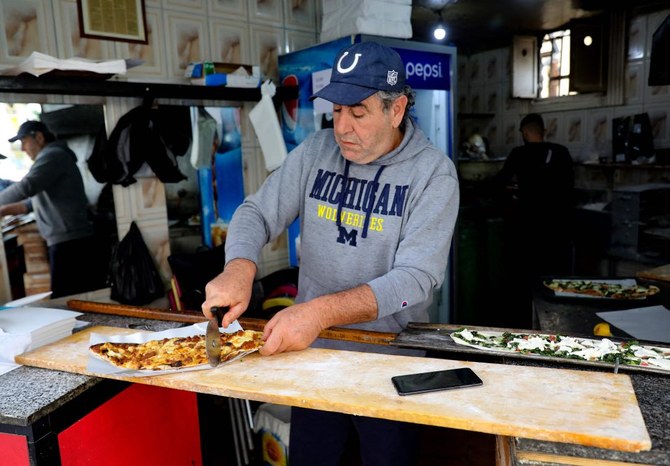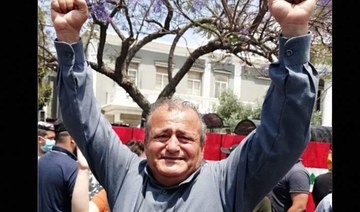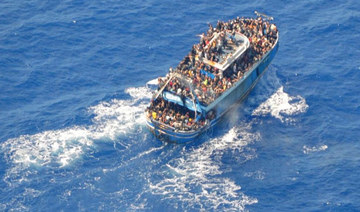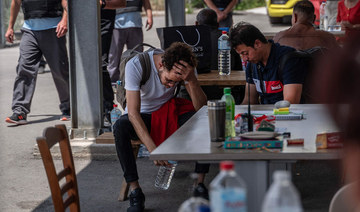BEIRUT — Scattering spinach and hot chili onto fluffy flatbread in Lebanon’s capital, 54-year-old Abu Shadi bemoans better times before the economic crisis when all Lebanese could afford his simple meals.
The veteran baker is famed for his take on Lebanon’s manousheh, a circle of freshly baked dough sprinkled with anything from thyme to meat, then folded in half and rolled in paper to go.
But Lebanon’s worse financial crunch in decades has sent prices soaring, and Abu Shadi says many of his customers of three decades can no longer afford even this modest pastry.
“Since I started working at this oven in 1987, it’s been nothing but goodness and blessings. But today, all that has gone,” he said.
On the phone, he warmly receives a stream of orders.
He jokes with a customer as he waits for his breakfast, and from inside his shop waves at an acquaintance as they drive by in their car.
Looking up from time to time from the flatbreads he heaps with filling, he greets the old and young as they walk by.
He hums loudly, only pausing to compliment an elderly lady on her blonde hairstyle.
But nowadays, Abu Shadi turns down the heat in his oven once he has baked enough manaeesh (plural form of manousheh) to save on gas.
Long gone are the days when he fired up the oven at 8:00 am, and did not turn it off till 3:00 pm.
“The manousheh is both a father and mother to the Lebanese people. It’s food for the rich and the poor,” he said.
“Sadly at the moment, the poor can no longer afford to eat it,” he said.
Tens of thousands have lost their jobs or a huge part of their income in the financial crunch, which has caused the Lebanese currency to lose more than 85 percent of its value.
A manousheh “used to cost between 1,000 to 1,500 pounds ($0.66 to $1), but now it’s 5,000.”
The new price is less than $0.50 at the black market rate for a lucky few with access to dollars, but most Lebanese earn wages in the local currency — and see that as up to five times the normal price.
The baker says that for three decades, customers have streamed in at weekends, ordering up to seven or eight manaeesh to take away for a traditional family breakfast.
But over the past few months, those customers have stopped coming altogether.
“Manaeesh are now only for the well off,” he said.
“Whoever earns 30,000 or 40,000 pounds a day is not going to spend 5,000 on a thyme manousheh. They have other expenses.”
But Abu Shadi has been forced to raise his prices to cover the increasing cost of supplies, from flour and cheese to the paper he wraps the manousheh in.
“We used to live a cushy life, but people’s living situations have really slumped,” he said.
“We’ve never seen anything like it.”
But one customer, Mahmoud, says he will continue to buy the bread he has grown to love, “whatever the cost.”
“Whoever is used to Abu Shadi’s manaeesh cannot replace it,” he said, between bites of one filled with cheese and meat.
Abu Shadi has been helped by the fact that his customers keep coming back.
But he says he has not been forced to close like other small bakers since he does the job on his own.
“After all this time and effort, I’m only still going because I work for myself,” he said.
“The money others pay to their staff, I keep to live off … I have nothing but my hands and God.”
Traditional manousheh leaves tables in poverty-hit Lebanon
https://arab.news/yz4c2
Traditional manousheh leaves tables in poverty-hit Lebanon

- Lebanon's worse financial crunch has sent prices soaring and baker Abu Shadi says many clients of three decades can no longer afford even manousheh
- Nowadays Abu Shadi turns down the heat in his oven once he has baked enough manaeesh to save on gas
Hamas authorities say over 100 academics killed in Gaza war
Top surgeon and professor of medicine Adnan Al-Barsh was also listed
GAZA STRIP, Palestinian Territories: Gaza authorities released a list on Thursday of more than 100 academics and researchers they say have been killed by Israeli forces since war broke out over seven months ago.
“We strongly condemn the occupation’s assassination of scientists, academics, university professors and researchers, who are a distinguished group in the Palestinian society in the Gaza Strip,” the Hamas government’s media office said in a statement.
“This sends a clear message that they aim to completely eliminate scientists and researchers in the educational sector,” it added.
Among those on the list of 104 names is Sufyan Tayeh, who was the president of the Islamic University and a leading researcher in physics and applied mathematics.
Top surgeon and professor of medicine Adnan Al-Barsh was also listed.
According to the Palestinian Prisoners Club, Barsh, 50, died in Israeli custody on April 19 after being detained with other doctors at Al-Awda Hospital in northern Gaza last December.
Asked at the time about his reported death in custody, the Israeli army said it was “currently not aware of such (an) incident.”
The Hamas government called on the “free countries of the world and all organizations related to education and higher education worldwide to condemn this historical crime and to pressure the occupation to stop the genocidal war.”
Its statement came against the backdrop of student protests against Israel’s conduct of the war on campuses across the United States and beyond.
Many of the demonstrators have called on their universities to divest from companies that allegedly contribute to human rights violations in the occupied Palestinian territories.
The bloodiest ever war in Gaza broke out when Hamas launched a surprise attack on Israel on October 7 that resulted in the deaths of more than 1,170 people, mostly civilians, according to an AFP tally of Israeli official figures.
Israel’s retaliatory war against Hamas has killed at least 35,272 people in Gaza, mostly women and children, according to the Hamas-ruled territory’s health ministry.
Buildings of Al-Aqsa University lie in ruin after it was destroyed during Israel’s military offensive. (Reuters/File)
Greek defense team says 9 Egyptians accused of causing deadly shipwreck were misidentified as crew

- The nine are due to go on trial in Kalamata on May 21 on a series of charges, including migrant smuggling, participation in a criminal organization and causing a deadly shipwreck
- They face multiple life sentences if convicted
ATHENS: The legal defense team for nine Egyptian men due to go on trial in southern Greece next week accused of causing one of the Mediterranean’s deadliest shipwrecks said Thursday they will argue that Greece has no jurisdiction in the case, and insisted their clients were innocent survivors who have been unjustly prosecuted.
The nine, whose ages range from early 20s to early 40s, are due to go on trial in the southern city of Kalamata on May 21 on a series of charges, including migrant smuggling, participation in a criminal organization and causing a deadly shipwreck. They face multiple life sentences if convicted.
The Adriana, an overcrowded fishing trawler, had been sailing from Libya to Italy with hundreds of asylum-seekers on board when it sank on June 14 in international waters off the southwestern coast of Greece.
The exact number of people on board has never been established, but estimates range from around 500 to more than 700. Only 104 people survived — all men and boys from Syria, Egypt, Pakistan and two Palestinians — and about 80 bodies were recovered. The vessel sank in one of the Mediterranean’s deepest areas, making recovery efforts all but impossible.
The Greek lawyers who make up the defense team spoke during a news conference in Athens on Thursday. They maintained their clients’ innocence, saying all nine defendants had been paying passengers who had been misidentified as crew members by other survivors who gave testimonies under duress just hours after having been rescued.
The nine “are random people, smuggled people who paid the same amounts as all the others to take this trip to Italy aiming for a better life, and they are accused of being part of the smuggling team,” lawyer and defense team member Vicky Aggelidou said.
Dimitris Choulis, another lawyer and member of the legal team, said that Greek authorities named the defendants as crew members following testimonies by nine other survivors who identified them for having done things as simple as handing bottles of water or pieces of fruit to other passengers.
“For nearly a year now, nine people have been in prison without knowing what they are in prison for,” Choulis said.
“For me, it is very sad to visit and see people in prison who do not understand why they are there,” he added.
While the Adriana was sailing in international waters, the area was within Greece’s search and rescue zone of responsibility. Greece’s coast guard had been shadowing the vessel for a full day without attempting a rescue of those on board. A patrol boat and at least two merchant ships were in the vicinity when the trawler capsized and sank.
In the aftermath of the sinking, some survivors said the coast guard had been attempting to tow the boat when it sank, and rights activists have accused Greek authorities of triggering the shipwreck while attempting to tow the boat out of Greece’s zone of responsibility.
Greek authorities have rejected accusations of triggering the shipwreck and have insisted the trawler’s crew members had refused to accept help from the nearby merchant ships and from the Greek coast guard.
A separate investigation being carried out by Greece’s naval court hasn’t yet reached any conclusion, and the defense team hasn’t been given any access to any part of it.
The Egyptians’ defense team also argues that because the shipwreck occurred in international waters, Greek courts don’t have jurisdiction to try the case, and the defense will move to have the case dismissed on those grounds when the trial opens in Kalamata next week.
Greece lies along one of the most popular routes into the European Union for people fleeing war and poverty in the Middle East, Africa and Asia. While most of those cross into the country’s eastern Aegean Sea islands from the nearby Turkish coast, others try to skirt Greece altogether and head from north Africa to Italy across the longer and more dangerous Mediterranean route.
On Thursday, Greece’s coast guard said that 42 people had been rescued and another three were believed to be missing after a boat carrying migrants sent out a distress call while sailing south of the Greek island of Crete.
Officials said they were alerted by the Italian coast guard overnight about a boat in distress 27 nautical miles (31 miles or 50 kilometers) south of Crete. Greece’s coast guard said that 40 people were rescued by nearby ships, and another two were rescued by a Greek navy helicopter.
A search and rescue operation was underway for three people reported by survivors as still missing. It wasn’t immediately clear what kind of vessel the passengers had been on, or why the boat sent out a distress call.
Turkiye convicts former pro-Kurdish party officials over Kobani protests

- Yuksekdag was sentenced to more than 30 years in prison
- The court has not yet ruled on the HDP co-leader Selahattin Demirtas
ANKARA: A Turkish court convicted former leading officials from the pro-Kurdish HDP party, including co-leader Figen Yuksekdag, on Thursday for instigating 2014 protests triggered by a Daesh attack on the Syrian Kurdish town of Kobani.
The verdict was likely to fuel political tensions in Turkiye around the Peoples’ Democratic Party (HDP), which is facing potential closure in a separate court case and has been succeeded in parliament by another pro-Kurdish party.
In total, Yuksekdag was sentenced to more than 30 years in prison. The court has not yet ruled on the HDP co-leader Selahattin Demirtas.
Thirty-seven people died in the 2014 protests, which were triggered by accusations that Turkiye’s army stood by as the ultra-hard-line Daesh militants besieged Kobani, a Syrian border town in plain view of Turkiye.
Those convicted were among 108 defendants, including senior HDP figures, charged with 29 offenses including homicide and harming the unity of the Turkish state. The HDP denied the charges.
Israel says more troops to ‘enter Rafah’ as operations intensify

- Israeli forces took control earlier in May of the Gaza side of the Rafah crossing with Egypt
- 600,000 people have fled Rafah since military operations intensified: UNRWA
JERUSALEM: Israel’s Defense Minister Yoav Gallant said that more troops would “enter Rafah” as military operations intensify in Gaza’s far-southern city, in remarks issued by his office Thursday.
The operation “will continue as additional forces will enter” the Rafah area, Gallant said, adding that “several tunnels in the area have been destroyed by our troops... this activity will intensify.”
“Hundreds of [terror] targets have already been struck, and our forces are manoeuvring in the area,” he said according to a statement released by his office after he visited Rafah the previous day.
Israeli forces took control earlier in May of the Gaza side of the Rafah crossing with Egypt, in a push launched in defiance of US warnings that around 1.4 million civilians sheltering there could be caught in the crossfire.
The United Nations agency for Palestinian refugees, UNRWA, has said “600,000 people have fled Rafah since military operations intensified” in Rafah.
Israeli Prime Minister Benjamin Netanyahu has vowed to launch a full-scale ground operation in Rafah in a bid to dismantle the remaining battalions of Hamas.
Gallant said that the military’s offensive against Hamas had hit the militant group hard.
“Hamas is not an organization that can reorganize, it does not have reserve troops, it has no supply stocks and no ability to treat the terrorists that we target,” he said.
“The result is that we are wearing Hamas down.”
However, Israel’s top ally the United States has warned that it had not seen any credible Israeli plan to protect civilians in Rafah.
Secretary of State Antony Blinken told NBC on Sunday that “Israel’s on the trajectory, potentially, to inherit an insurgency with many armed Hamas left or, if it leaves, a vacuum filled by chaos, filled by anarchy and probably refilled by Hamas.”
The Gaza war broke out after Hamas’s unprecedented October 7 attack on southern Israel which resulted in the deaths of more than 1,170 people, mostly civilians, according to an AFP tally based on Israeli official figures.
Israel’s military retaliation has killed at least 35,272 people, mostly civilians, according to the health ministry in Hamas-ruled Gaza.
Tunisia blasts foreign criticism of arrests as ‘interference’

- Several prominent Tunisian pundits, journalists, lawyers and civil society figures have been arrested in recent days
- Late Saturday, masked police raided the Tunisian bar association headquarters and forcibly arrested lawyer Sonia Dahmani
TUNIS: Tunisian President Kais Saied on Thursday denounced foreign “interference” following international criticism of a recent flurry of arrests of political commentators, lawyers and journalists in the North African country.
Saied, who in 2021 orchestrated a sweeping power grab, ordered the foreign ministry to summon diplomats and “inform them that Tunisia is an independent state.”
Speaking during a televised meeting, the president told Mounir Ben Rjiba, state secretary to the foreign ministry, to “summon as soon as possible the ambassadors of a number of countries,” without specifying which ones.
Ben Rjiba was asked to “strongly object to them that what they are doing is a blatant interference in our internal affairs.”
“Inform them that Tunisia is an independent state that adheres to its sovereignty,” Saied added.
“We didn’t interfere in their affairs when they arrested protesters... who denounced the war of genocide against the Palestinian people,” he added, referring to demonstrations on university campuses in the United States and elsewhere over the Israel-Hamas war.
Several prominent Tunisian pundits, journalists, lawyers and civil society figures have been arrested in recent days, many of whom over a decree that punishes “spreading false information” with up to five years in prison.
Since Decree 54 came into force with Saied’s ratification in 2022, more than 60 journalists, lawyers and opposition figures have been prosecuted under it, according to the National Union of Tunisian Journalists.
Late Saturday, masked police raided the Tunisian bar association headquarters and forcibly arrested lawyer Sonia Dahmani over critical comments she had made on television.
On Monday police entered the bar association again and arrested Mehdi Zagrouba, another lawyer, following a physical altercation with officers. Zagrouba was subsequently hospitalized.
The arrests have sparked Western condemnation.
The European Union on Tuesday expressed concern that Tunisian authorities were cracking down on dissenting voices.
France denounced “arrests, in particular of journalists and members of (non-governmental) associations,” while the United States said they were “in contradiction” with “the universal rights explicitly guaranteed by the Tunisian Constitution.”
The media union said Wednesday that Decree 54 was “a deliberate attack on the essence of press freedom and a vain attempt to intimidate journalists and media employees and sabotage public debate.”
NGOs have decried a rollback of freedoms in Tunisia since Saied — who was elected democratically in October 2019 with a five-year mandate — began ruling by decree following the July 2021 power grab.




















